SWEDISH
SOUTH ASIAN STUDIES NETWORK
Newsletter 107:
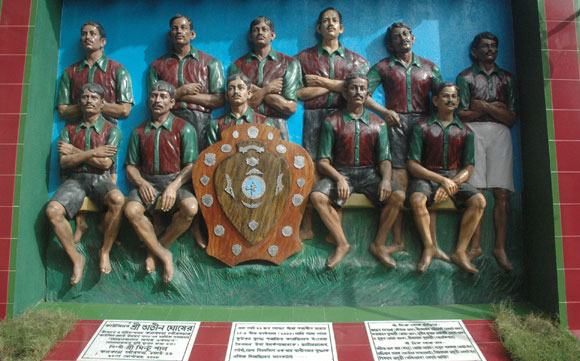 |
The historic Mohun Bagan AC football team that lifted the IFA Shield in 1911,
the first Indian team to defeat the British. Recent memorial at Shyam Bazar, Kolkata, India. Photo: Lars Eklund |
12 March 2010
| Educational News |
| Lectures and seminars |
| Business and Politics |
| South Asia related Culture |
| New and updated information |
• Extra board meeting discussed SASNET’s future
 On Wednesday 9 December 2009, SASNET held an extra board meeting. The main reason was the urgent need to discuss the future prospects for SASNET after December 31, 2009, when the Sida funding ended.
On Wednesday 9 December 2009, SASNET held an extra board meeting. The main reason was the urgent need to discuss the future prospects for SASNET after December 31, 2009, when the Sida funding ended.
Anna Lindberg reported from the meeting at the Ministry of Education in Stockholm on November 30, 2009, her discussions with the Swedish Research Council regarding possible infrastructural support, and from the meeting with Lund University’s Assistant Vice Chancellor Sven Strömqvist on December 7th.
The meetings in Stockholm did not lead to any positive results (more information).
Discussions with Lund University, on the other hand, were more positive. Lund has promised to keep its funding on the same level as before, and may even be willing to provide extra funding for the network in 2010.
The board was much engaged in discussing options for the future, and several members suggested that SASNET should actively try to find solutions that may get the Swedish funding agencies and authorities interested to support the network and its activities. It was also suggested that SASNET should explore Nordic and European collaboration. It was pointed out that in the current globalizing world, a network like SASNET is more relevant than ever, and that this gives us a great potential for the future if we just can survive through the current crisis.
Board members also stressed the importance of qualified research on Afghanistan and Islam, and that SASNET may play a positive role in this.
Besides this main discussion, the board also approved
a decision by the Lund University Vice Chancellor to reappoint Anna Lindberg as SASNET’s Director, for the period January 1, 2010 – December 31, 2012, and a decision to prolong the period for the current SASNET board with 9 months until September 30, 2010.
Finally, the board also decided to redistribute one SASNET guest lecture programme grant, since Prof. Margareta Petersson, School of Humanities, Linnaeus University, Växjö, had decided to withdraw her already accepted grant application. Instead the grant was distributed to Dr. Ann-Kristin Boström, School of Education and Communication (HLK), Jönköping University, in order to invite Dr. K. Pushpanadham from M.S. University of Baroda, India, to give guest lectures at Jönköping and other Swedish universities.
Read the verified Minutes from the board meeting.
SASNET’s next board meeting will be held at Uppsala University on Tuesday 11 May 2010.
• SASNET lecture on Democracy and Poverty in India
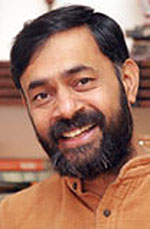 Prof. Yogendra Yadav, Senior Fellow at the Centre for the Study of Developing Societies, Delhi, India, holds a SASNET lecture on ”Democracy and Poverty in India”, on Thursday 18 March 2010, 14.15–16.00. The seminar is organised in collaboration with the Centre for East and South-East Asian Studies (ACE). Currently Yadav is a Fellow at the Institute of Advanced Study at Berlin, Germany, for the year 2009–2010. His areas of interests include democratic theory, election studies, survey research, political theory, modern Indian political thought and Indian socialism. He has co-authored State of Democracy in South Asia (OUP, 2008) and co-edited (with Sandeep Shastri and K C Suri) Electoral Politics in Indian States (OUP, 2009). He has also been involved in designing and coordinating the National Election Studies, the most comprehensive series of academic surveys of the Indian electorate, from 1996 to 2009. Venue: Javasalen, Ideon Alfa 1 building, Scheelevägen 15, ground floor (next to the Asia Library), Lund.
More information.
Prof. Yogendra Yadav, Senior Fellow at the Centre for the Study of Developing Societies, Delhi, India, holds a SASNET lecture on ”Democracy and Poverty in India”, on Thursday 18 March 2010, 14.15–16.00. The seminar is organised in collaboration with the Centre for East and South-East Asian Studies (ACE). Currently Yadav is a Fellow at the Institute of Advanced Study at Berlin, Germany, for the year 2009–2010. His areas of interests include democratic theory, election studies, survey research, political theory, modern Indian political thought and Indian socialism. He has co-authored State of Democracy in South Asia (OUP, 2008) and co-edited (with Sandeep Shastri and K C Suri) Electoral Politics in Indian States (OUP, 2009). He has also been involved in designing and coordinating the National Election Studies, the most comprehensive series of academic surveys of the Indian electorate, from 1996 to 2009. Venue: Javasalen, Ideon Alfa 1 building, Scheelevägen 15, ground floor (next to the Asia Library), Lund.
More information.
• SASNET lecture on India's Changing
Role in the Global Political Economy
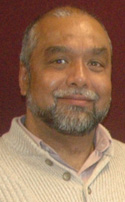 Anthony P. D'Costa,
Professor of Indian Studies at the
Asia Research Centre (ARC),
Copenhagen Business School, will hold a SASNET lecture at Lund University on Monday 19 April 2010, 11.15–13.00. Prof. D’Costa will talk about ”India's Changing
Role in the Global Political Economy”. Prior he came to ARC in 2008, Prof. D’Costa was with the University of Washington for eighteen years. He has written extensively on the global steel, Indian automobile and IT industries, globalization, development, innovations, and industrial restructuring. He is currently working on globalization and the international mobility of IT workers examining migration pattern, immigration policies, national innovation systems, and tertiary education in India, China, Japan, and the US, co-authoring a photographic essay on Indian modernity and industrialization, and editing volumes on economic nationalism and the development experiences of India and China. More information about Anthony D’Costa.
Anthony P. D'Costa,
Professor of Indian Studies at the
Asia Research Centre (ARC),
Copenhagen Business School, will hold a SASNET lecture at Lund University on Monday 19 April 2010, 11.15–13.00. Prof. D’Costa will talk about ”India's Changing
Role in the Global Political Economy”. Prior he came to ARC in 2008, Prof. D’Costa was with the University of Washington for eighteen years. He has written extensively on the global steel, Indian automobile and IT industries, globalization, development, innovations, and industrial restructuring. He is currently working on globalization and the international mobility of IT workers examining migration pattern, immigration policies, national innovation systems, and tertiary education in India, China, Japan, and the US, co-authoring a photographic essay on Indian modernity and industrialization, and editing volumes on economic nationalism and the development experiences of India and China. More information about Anthony D’Costa.
The seminar will be co-organised by the Sweden India Business Council (SIBC), and held with kind support from the Embassy of India in Sweden. The Indian Ambassador, H.E. Mr Balkrishna Shetty, will participate in the seminar, holding an introductory speech. Venue for the seminar: Museum of Cultural History/Auditorium (Kulturens hörsal), Tegnérplatsen, Lund.
• Copenhagen discussions on future collaboration
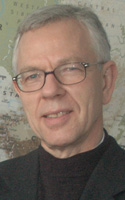 On Thursday 4 March 2010, Anna Lindberg and Lars Eklund visited the Nordic Institute of Asian Studies (NIAS), and the Asia Research Centre (ARC) at Copenhagen Business School in Copenhagen. At NIAS, fruitful discussions were held with the Director, Dr. Geir Helgesen (photo), and at ARC a meeting was organised with the Research Director Anthony D’Costa, Professor of Indian Studies, Kjeld Erik Brødsgaard, Director for Asia Research Centre, Ms. Bente Faurby, ARC Administrator, and Dr. Sudipta Bhattacharyya, holding the first visiting ICCR Chair in Indian Economics at ARC during the academic year 2009-2010. More information about the Copenhagen visit.
On Thursday 4 March 2010, Anna Lindberg and Lars Eklund visited the Nordic Institute of Asian Studies (NIAS), and the Asia Research Centre (ARC) at Copenhagen Business School in Copenhagen. At NIAS, fruitful discussions were held with the Director, Dr. Geir Helgesen (photo), and at ARC a meeting was organised with the Research Director Anthony D’Costa, Professor of Indian Studies, Kjeld Erik Brødsgaard, Director for Asia Research Centre, Ms. Bente Faurby, ARC Administrator, and Dr. Sudipta Bhattacharyya, holding the first visiting ICCR Chair in Indian Economics at ARC during the academic year 2009-2010. More information about the Copenhagen visit.
The SASNET visit to Copenhagen was part of an ongoing strategic work to strenghten collaboration with Nordic institutions engaged in South Asia related research and other activities. Earlier Lars and Anna have also visited researchers at the University of Copenhagen, and representatives for the university’s Asian Dynamics Initiative (ADI).
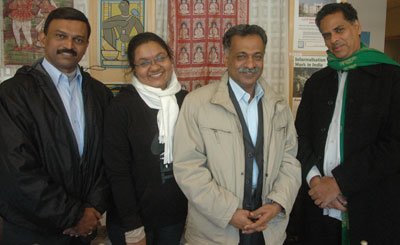 |
| Kerala University visitors to SASNET, from left to right: R. Dilip, Maya Raman, J. Prabhash and Achuthsankar S. Nair. |
• Kerala University delegation visited SASNET
On Thursday 11 February 2010, a delegation from the University of Kerala visited SASNET’s office in Lund. The group consisted of Dr. J. Prabhash, Pro Vice Chancellor, University of Kerala in Kariavattom, Thiruvananthapuram; Dr. Achuthsankar S. Nair, Director, Centre for Bioinformatics, and a member of the Kerala State Higher Education Council; and Mr. R. Dilip, Administrative Officer, Centre for Bioinformatics. They had come to Lund to participate in the Erasmus Mundus External Cooperation Window (EMECW) India lot 13 consortium meeting. Kerala University is a member of this Indo-European university consortium coordinated by Lund University. The Kerala University delegation was accompanied to SASNET’s office by Dr. Maya Raman from the School of Industrial Fisheries, Cochin University of Science and Technology, Kerala, India, but currently working as a post-doc EMECW scholarship holder at the Dept. of Applied Nutrition and Food Chemistry, Lund University.
• Anna Lindberg reports from meetings in Kerala
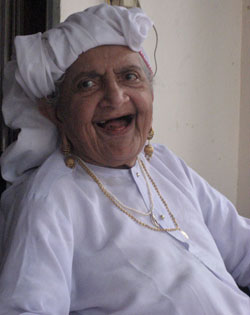 In February 2010, SASNET’s Director Anna Lindberg made a short tour to Kerala. She visited the Centre for Research and Education for Social Transformation (CREST) in Kozhikode, the Centre for Bioinformatics at Kerala University, the Centre for Women’s Studies, also at Kerala University, and the Centre for Development Studies in Thiruvananthapuram. She also met Kerala’s finance minister Thomas Isaac in order to discuss the development in Kerala over the past ten years. Read her Kerala report.
In February 2010, SASNET’s Director Anna Lindberg made a short tour to Kerala. She visited the Centre for Research and Education for Social Transformation (CREST) in Kozhikode, the Centre for Bioinformatics at Kerala University, the Centre for Women’s Studies, also at Kerala University, and the Centre for Development Studies in Thiruvananthapuram. She also met Kerala’s finance minister Thomas Isaac in order to discuss the development in Kerala over the past ten years. Read her Kerala report.
(Photo by Anna from Kozhikode)
• Time to register for the 2010 Falsterbo conference
The second SASNET conference on
South Asian Studies for young Nordic scholars will be held in Höllviken, south of Malmö, on 18–20 August 2010. This will be a follow-up to the successful conference on the same topic that SASNET arranged last year (more information about the 2009 conference). It proved to make a difference from the standard academic conferences and paid attention explicitly to the students. Something that was evaluated very positively from all participants .
The 2010 conference will again be held at Falsterbo conference retreat (Falsterbo kursgård) in Höllviken. The aim is to gather master students, doctoral students, and young post-docs in the Nordic countries (Denmark, Finland, Iceland, Norway and Sweden) who focus on South Asia in their studies or research. The conference will provide an opportunity for young scholars from all disciplines to present their future and ongoing research projects, establish contacts with colleagues in the Nordic countries, and discuss the challenges and opportunities of career planning and conducting research in South Asian Studies.
This year’s topics in focus are Interdisciplinary research, Field Work and Ethics, as well as Academic Career (Publishing, Teaching, Networking).
The keynote speaker will be Prof. Emeritus Graham Chapman from the Dept. of Geography, Lancaster University, UK. Other main speakers will be
Dr. Sirpa Tenhunen, Department of Social and Cultural Anthropology, University of Helsinki, Finland; Mr. Teddy Primack, Director of Academic Documents Associates, USA; Associate Professor Jan Vang, Department of Production, Aalborg University, Denmark; and Dr. Anna Godhe, Department of Marine Ecology, University of Gothenburg.
The deadline to register for the conference is 30 April 2010. More information on the conference web page.
• More information about SASNET and its
activities
See SASNET’s page, http://www.sasnet.lu.se/sasnet.html
• No grants from the Swedish Research Links programme in 2010
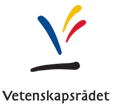 No grants will be distributed from the Swedish Research Links programme in 2010. This is due to the fact that the programme will be evaluated during 2010, and therefore no call will be given during this year. Swedish Research Links grants were introduced
by the Swedish International Development Cooperation Agency (Sida), and the Swedish
Research Council in 2002, with an aim to stimulate
cooperation between researchers in Sweden and those in developing countries, including South Asia (see SASNET’s information about South Asia related grants from 2002-2009).
They have provided support both in the form of
International Collaborative Research Grants (for three years), and for
one-year International Planning Grants. Information concerning a possible call 2011 for the Swedish Research Links programme will be published on the Swedish Research Council’s website in the middle of October 2010 at the earliest. More information.
No grants will be distributed from the Swedish Research Links programme in 2010. This is due to the fact that the programme will be evaluated during 2010, and therefore no call will be given during this year. Swedish Research Links grants were introduced
by the Swedish International Development Cooperation Agency (Sida), and the Swedish
Research Council in 2002, with an aim to stimulate
cooperation between researchers in Sweden and those in developing countries, including South Asia (see SASNET’s information about South Asia related grants from 2002-2009).
They have provided support both in the form of
International Collaborative Research Grants (for three years), and for
one-year International Planning Grants. Information concerning a possible call 2011 for the Swedish Research Links programme will be published on the Swedish Research Council’s website in the middle of October 2010 at the earliest. More information.
Applications for ordinary project grants from the Swedish Research Council should be submitted before 30 March 2010. More information.
• Time to apply for Sida’s development research project grants
 The deadline to apply for research project grants from the Swedish
International Development Cooperation Agency (Sida) for the period 2011–2013 is Monday 12 April 2010. Sida provides grants
to support Swedish development research through its Developing
Country Research Council (u-landsforskningsrådet).
These so-called uforsk grants belong to the most
important ways of financing Swedish research projects related to developing
countries, including South Asia (see SASNET’s information about South Asia related grants from 2003-2009). The aim is to establish and maintain
a knowledge base of relevance to aid and development issues, plus
capacity for developing country research in Sweden. Researchers working at universities/colleges or other
research institutions in Sweden may apply for grants. Swedish citizens
working at the Nordic Institute for Asian Studies (NIAS) in Copenhagen
may also apply.
The deadline to apply for research project grants from the Swedish
International Development Cooperation Agency (Sida) for the period 2011–2013 is Monday 12 April 2010. Sida provides grants
to support Swedish development research through its Developing
Country Research Council (u-landsforskningsrådet).
These so-called uforsk grants belong to the most
important ways of financing Swedish research projects related to developing
countries, including South Asia (see SASNET’s information about South Asia related grants from 2003-2009). The aim is to establish and maintain
a knowledge base of relevance to aid and development issues, plus
capacity for developing country research in Sweden. Researchers working at universities/colleges or other
research institutions in Sweden may apply for grants. Swedish citizens
working at the Nordic Institute for Asian Studies (NIAS) in Copenhagen
may also apply.
Among the new stipulations set up by Sida last year are requirements that the proposed research projects should have a clear relevance for Sweden’s policy for global development, with a focus on three preferential thematic areas, namely – Democracy and human rights; – Gender equality and women’s role in development; and – Environment and climate change. They shoudl also have a land focus in accordance with the Swedish government’s priorities – which in the South Asia case means primarily Bangladesh and Afghanistan and in a selective mode also India.
Read the announcement for grants (only in Swedish).
Because of a strained economy, Sida will not announce any Planning Grants, nor Grants to new Networks in 2010.
• India Media Centre established at University of Westminster
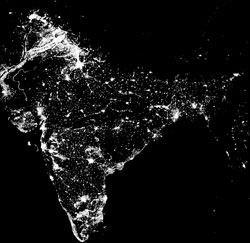 On Tuesday 9 March 2010, University of Westminster in London launched the India Media Centre – the world’s first academic centre wholly dedicated to the study of media in India and its globalizing tendencies. Westminster university, which pioneered Media Studies in the UK, aims to raise the academic profile of one of the most diverse and dynamic media systems in the world and one that is increasingly seen as playing an integral role in the global media sphere. The India Media Centre will promote and develop advanced research on the aesthetic, commercial and globalising tendencies of Indian media and mediated culture in both transnational, as well as historical contexts. During the inauguration, noted Indian film director Shyam Benegal held the keynote speech. More information.
On Tuesday 9 March 2010, University of Westminster in London launched the India Media Centre – the world’s first academic centre wholly dedicated to the study of media in India and its globalizing tendencies. Westminster university, which pioneered Media Studies in the UK, aims to raise the academic profile of one of the most diverse and dynamic media systems in the world and one that is increasingly seen as playing an integral role in the global media sphere. The India Media Centre will promote and develop advanced research on the aesthetic, commercial and globalising tendencies of Indian media and mediated culture in both transnational, as well as historical contexts. During the inauguration, noted Indian film director Shyam Benegal held the keynote speech. More information.
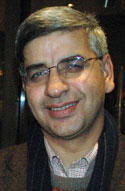 The centre will be directed by Daya Thussu (photo), Professor of International Communication, holding a PhD in international relations from Jawaharlal Nehru University (JNU), and Rosie Thomas, Director of the university’s Centre for Research and Education in Arts and Media (CREAM), and a television producer and historian of Hindi cinema.
The centre will be directed by Daya Thussu (photo), Professor of International Communication, holding a PhD in international relations from Jawaharlal Nehru University (JNU), and Rosie Thomas, Director of the university’s Centre for Research and Education in Arts and Media (CREAM), and a television producer and historian of Hindi cinema.
More information about the India Media Centre.
• Academic collaboration on Asian studies between Oslo and Austin
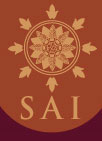 An Academic and Scientific Cooperation and Exchange Agreement has been finalized between the Department of Asian Studies (DAS) at University of Texas (UT) in Austin, USA, and the Department of Culture Studies and Oriental Languages (IKOS) at the University of Oslo, Norway. The main objective has been to explore possible forms of exchange in both research and teaching, since the two departments have a strikingly similar structure, in that research, teaching, and language training are related to a variety of geographical areas (and time periods) of Asia. Just like DAS, IKOS houses a number of renowned scholars in several fields of Asian Studies, many of them focusing on South Asian Studies (Torkel Brekke, Geir Heierstad, Ute Hüsken, Pamela Price, Kathryn Hansen, Claus Peter Zoller, and
Arild Engelsen Ruud).
An Academic and Scientific Cooperation and Exchange Agreement has been finalized between the Department of Asian Studies (DAS) at University of Texas (UT) in Austin, USA, and the Department of Culture Studies and Oriental Languages (IKOS) at the University of Oslo, Norway. The main objective has been to explore possible forms of exchange in both research and teaching, since the two departments have a strikingly similar structure, in that research, teaching, and language training are related to a variety of geographical areas (and time periods) of Asia. Just like DAS, IKOS houses a number of renowned scholars in several fields of Asian Studies, many of them focusing on South Asian Studies (Torkel Brekke, Geir Heierstad, Ute Hüsken, Pamela Price, Kathryn Hansen, Claus Peter Zoller, and
Arild Engelsen Ruud).
A delegation from Oslo visited Austin in April 2009, and a group from UT paid a counter visit to Oslo in August. The first teaching exchange takes place in the spring semester of 2010. Dr. Ute Hüsken from IKOS has given a series of talks and seminars related to her field of expertise, South Indian temple culture. In turn, Dr. Joel Brereton from DAS will teach Vedic Sanskrit at IKOS, a field in which UT is one of the leading universities in the world. The cooperation agreement between the two sister departments opens up many exciting possibilities of academic exchange. More information.
• Stockholm University anthropologists strong on South Asia research
Dr. Bengt
G. (Beppe) Karlsson (photo), previously researcher at the Dept. of Cultural Anthropology and Ethnology, Uppsala University, has shifted over to Stockholm University. From January 2010, he has a position at its Dept. of Social Anthropology. In his research, Beppe has focused on the politics of indigenousness and nature in India from an anthropological
and historical perspective, particularly the struggle over forests and natural resources. More information on his research.
The Dept. of Social Anthropology, Stockholm University, is one of the leading Swedish university departments
when it comes to South Asia related research. Among other researchers should be mentioned Dr. Eva-Maria Hardtmann, currently involved in a major research project entitled ”Transnational networks within the Global Solidarity Movement: Four Social Movements originated from India, Japan, France, and Honduras” (funded in 2008 with a three-year grant by the Bank of Sweden Tercentenary Foundation, more information); Dr. Christer Norström, now working on a research project entitled ”Whose Agenda?: A Local Environmental NGO in the Middle of a Turmoil of Perspectives”, based on fieldwork in Tamil Nadu, India (more information); and Dr. Marie Larsson, working on a research project entitled ”The Invisible labourers! Transnational and local activism among home-based women workers in Manila, Leeds and Ahmedabad” (funded by the Bank of Sweden Tercentenary Foundation in 2009, more information).
Researchers from the Dept. of Social Anthropology, Stockholm University, have also recently been given positions at other universities. Since 1 March 2010 Dr. Per Ståhlberg, who in recent years has been involved in a major research project entitled ”India
as a Global Superpower; An Anthropological Study of Future Visions”, works as Associate Professor at the Division of Media and Communication Studies, Södertörn University College in Huddinge, south of Stockholm (more information); whereas Dr. Björn Alm, who defended his doctoral dissertation entitled ”The
un/selfish leader. Changing notions in a Tamil Nadu village”
in 2006, now works at the Division for Social
Anthropology, Department
of Religion and Culture (IRK), Linköping University. Finally, Dr. Paolo Favero, who defended his doctoral dissertation on ”India
dreams: Cultural identity among young middle-class men in New Delhi” in 2005,
has got a position at Centro de Estudos
de Antropologia Social (CEAS), Instituto Superior de Ciências do Trabalho e da Empresa (ISCTE), University of Lisbon, Portugal (more information).
• Nordic South Asian Studies conference in Helsinki
 The 2010 Nordic Association for South Asian Studies conference and PhD workshop will be held 26–29 May 2010 in
Helsinki, Finland. The theme for the conference will be ”Globalizing South Asia”, and it is
organised by the University of Helsinki. The conference aims to bring
scholars from different fields within humanities and social sciences
(history, anthropology, sociology, economics, geography, environmental
science, development studies and political science) together to analyze
cultural, economic, political and environmental connections in South
Asia. Both Nordic and non-Nordic scholars are invited to participate in
the conference that is meant to stimulate networking and exchange, and
to create a forum for discussions for scholars and doctoral students
within and outside the Nordic countries.
The 2010 Nordic Association for South Asian Studies conference and PhD workshop will be held 26–29 May 2010 in
Helsinki, Finland. The theme for the conference will be ”Globalizing South Asia”, and it is
organised by the University of Helsinki. The conference aims to bring
scholars from different fields within humanities and social sciences
(history, anthropology, sociology, economics, geography, environmental
science, development studies and political science) together to analyze
cultural, economic, political and environmental connections in South
Asia. Both Nordic and non-Nordic scholars are invited to participate in
the conference that is meant to stimulate networking and exchange, and
to create a forum for discussions for scholars and doctoral students
within and outside the Nordic countries.
The keynote speakers will be Professor Steve Derne, State University of New York at Geneseo, USA; Prof. Bishnupriya Ghosh, University of California, Santa Barbara, USA; Prof. William Mazzarella, University of Chicago, USA; and Prof. Himanshu Rai, Centre for Historical Studies, Jawaharlal Nehru University (JNU), India. A peer-reviewed volume of selected papers will be published after the
conference.
Anna Lindberg and Lars Eklund from SASNET will both participate in the Helsinki conference.
Full information about the 2010 NASA conference.
• Survey on new EU Network for European Researchers in India
 EURAXESS Links India is the name of a network now being considered for European researchers, and science and technology students on MA and PhD levels in India. The network would also include Europeans ”commuting” between Europe and India. The project is supported by the European Commission’s Directorate General for Research, and the Delegation of the EU to India, in collaboration with the embassies of the EU member states in India. It would provide web based and other services for researchers who are interested in strengthening their contacts with other European researchers in India and Europe.
EURAXESS Links India is the name of a network now being considered for European researchers, and science and technology students on MA and PhD levels in India. The network would also include Europeans ”commuting” between Europe and India. The project is supported by the European Commission’s Directorate General for Research, and the Delegation of the EU to India, in collaboration with the embassies of the EU member states in India. It would provide web based and other services for researchers who are interested in strengthening their contacts with other European researchers in India and Europe.
So far, a survey has been launched to identify ways of developing the network and the types of information and services that would be useful to European researchers in India as well as to European researchers commuting frequently between Europe and India. The results of this survey will be used to possibly develop the network. Similar networks are already up and running in the USA, Japan and China. More information, with a link to the survey.
ENCARI network dead and buried
 The European Network for Contemporary Academic Research on India (ENCARI), formally launched in 2007, has been closed down. ENCARI, orginally named ANERI (Academic Network for European Research related
to India), was initiated during the 19th European Conference for Modern
South Asian Studies held in Leiden in June 2006. The
project was prepared by a team consisting of Dr Willem
van der Geest, Dr Kunal Sen, and Dr Lawrence Saez. During the Spring 2006
they visited institutions and met researchers all over Europe
in order to work out a strategy for the network. SASNET was a partner in these discussions. More
details about the project.
The European Network for Contemporary Academic Research on India (ENCARI), formally launched in 2007, has been closed down. ENCARI, orginally named ANERI (Academic Network for European Research related
to India), was initiated during the 19th European Conference for Modern
South Asian Studies held in Leiden in June 2006. The
project was prepared by a team consisting of Dr Willem
van der Geest, Dr Kunal Sen, and Dr Lawrence Saez. During the Spring 2006
they visited institutions and met researchers all over Europe
in order to work out a strategy for the network. SASNET was a partner in these discussions. More
details about the project.
ENCARI
was assigned a role to offer policy formulation support for the EU Commission's services engaging India and developing EU-India political and economic cooperation. A number of ENCARI Briefing Papers on specific topics were prepared, covering a broad range of crucial issues in EU–India relations. These policy papers provided the key input for an ENCARI Round Table, that was convened at the European Commission in Brussels in 2007.
ENCARI’s member organisations were invited to participate in the conference, and SASNET sent three Swedish representatives to Brussels. More information.
• Lund/Gothenburg collaboration on South Asian religious studies
On 11 February 2010, the Vice Chancellors at Lund University (LU) and the University of Gothenburg (GU) decided to give grants to a number of joint projects in order to strenghten the collaboration between the two universities. More information (only in Swedish).
One of the projects relates to the establishment of a strong national platform for the study of South Asian religions at LU and GU. An application for this project came from the Dept. of History and Anthropology
of Religion, Centre for Theology and Religious Studies (CTR) Lund University (through Prof. Olle Qvarnström and Dr. Kristina Myrvold), and the Dept. of Literature, History of Ideas, and Religion (LIR), University of Gothenburg (through Prof. Åke Sander, Dr. Daniel Andersson and Dr. Clemens Cavallin). The grant /SEK 150 000) will be used to develop cooperation in education, course work and research, and to formalise and make common their already existing exchange programmes with three North Indian universities, Punjabi University in Patiala, Banaras Hindu University (BHU) in Varanasi, and Jadavpur University in Kolkata.
During 2010, researchers and students at both universities will have planning meetings to discuss the continued work. The ambition is to build on strong profile areas that have been developed at the respective universities. In Gothenburg, LIR is for example involved in a major interdisciplinary project on Myth and Narrative, whereas in Lund, research in Sikh and Punjabi studies has become strongly established, not the least through a Nordic collaboration project on Sikh Identity Formation. The important networking role of SASNET, based at Lund University, was also pointed out in the successful application.
• Cooperation agreement between Gothenburg and IUB, Dhaka
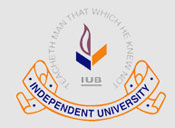 On 18 February 2010, a formal Agreement of Cooperation was signed by University of Gothenburg and the Independent University of Bangladesh (IUB) in Dhaka, Bangladesh. The agreement aims at promoting exchange of students and faculty, but also joint research activities and an exchange of publications, reports and other academic information, between the School of Liberal Arts and Science at IUB, and the School of Global Studies and the Dept. of Journalism and Mass Communication (JMG) at the University of Gothenburg. This Bangladeshi-Swedish collaboration was initiated in 2008, when Jan Johansson, Section of Social Anthropology, School of Global Studies, received a SASNET guest lecture programme grant to invite a professor from IUB to Gothenburg (and also to the Uppsala Centre for Sustainable Development, CSD).
Another IUB researcher,
Assistant Professor Manzurul Mannan, will come to Sweden in March 2010 to hold lectures at the University of Gothenburg (see below), besides participating in the International conference entitled ”Power to the People?
(Con-) Tested Civil Society in Search of Democracy” that will be held in Uppsala on 23–24 March 2010. More information.
On 18 February 2010, a formal Agreement of Cooperation was signed by University of Gothenburg and the Independent University of Bangladesh (IUB) in Dhaka, Bangladesh. The agreement aims at promoting exchange of students and faculty, but also joint research activities and an exchange of publications, reports and other academic information, between the School of Liberal Arts and Science at IUB, and the School of Global Studies and the Dept. of Journalism and Mass Communication (JMG) at the University of Gothenburg. This Bangladeshi-Swedish collaboration was initiated in 2008, when Jan Johansson, Section of Social Anthropology, School of Global Studies, received a SASNET guest lecture programme grant to invite a professor from IUB to Gothenburg (and also to the Uppsala Centre for Sustainable Development, CSD).
Another IUB researcher,
Assistant Professor Manzurul Mannan, will come to Sweden in March 2010 to hold lectures at the University of Gothenburg (see below), besides participating in the International conference entitled ”Power to the People?
(Con-) Tested Civil Society in Search of Democracy” that will be held in Uppsala on 23–24 March 2010. More information.
• CeMIS announces professorship in State and Democracy in Modern India
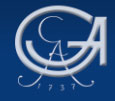 The Centre for Modern Indian Studies (CeMIS) at the Georg-August-University Göttingen, Germany invites applications for the position of a Full Professorship in State and Democracy in Modern India. Applications are invited from internationally recognized candidates working in any field of political science or political sociology who have a demonstrated regional specialization in India or South Asia. This includes particularly candidates working on state formation, democratization and the political system in India in comparative perspective, with a view to broader questions of modern constitutional theory and reality. Deadline for applications is 18 March 2010. More information.
The Centre for Modern Indian Studies (CeMIS) at the Georg-August-University Göttingen, Germany invites applications for the position of a Full Professorship in State and Democracy in Modern India. Applications are invited from internationally recognized candidates working in any field of political science or political sociology who have a demonstrated regional specialization in India or South Asia. This includes particularly candidates working on state formation, democratization and the political system in India in comparative perspective, with a view to broader questions of modern constitutional theory and reality. Deadline for applications is 18 March 2010. More information.
Candidates must have an interest in, and strong commitment to, inter-disciplinary research cooperation with the other departments of the newly created Centre for Modern Indian Studies. The first department which was already established in the summer 2009, was the Dept. of Modern Indian History, headed by Prof. Ravi Ahuja. Another well-known researcher, Thomas Blom Hansen, was awarded with an Alexander-von-Humboldt professorship by the university in October 2009, and has been offered to head the coming Dept. of Society and Culture of Modern India (more information). Finally, professorships have been announced for three other coming departments, namely the Dept. of Indian Economic Development, the Dept. of Indian Religions, and the Dept. of Anthropology of Public Health (with a regional focus on South Asia).
• London School of Economics announces South Asia related fellowships
 The Asia Research Centre (ARC) at London School of Economics & Political Science (LSE) invites applications for a number of South Asia related fellowships:
The Asia Research Centre (ARC) at London School of Economics & Political Science (LSE) invites applications for a number of South Asia related fellowships:
– The Sir Ratan Tata Foundation at LSE invites applications for the Sir Ratan Tata Fellowship 2010/11, now in its fourteenth year. Applicants should be established scholars in the social sciences with experience of research on South Asia. Applicants should hold a PhD or comparable qualifications and experience – the fellowship is not intended for students registered for a degree or diploma, nor is it intended for senior academics.
The Fellowship is open to candidates from South Asia, that is, the SAARC region which includes Bangladesh, Bhutan, India, Maldives, Nepal, Pakistan and Sri Lanka. Final date for applications is Monday 17 May 2010. More information.
– The CR Parekh Fellowship 2010/11 is available for established scholars in the social sciences with experience of research on India. Applicants should hold a PhD or comparable qualifications and experience – the fellowship is not intended for students registered for a degree or diploma, nor is it intended for senior academics.
The Fellow will be expected to engage in research on a topic under the following themes: Poverty, Inequality, Human Development and Social Exclusion; Quality of Public Life; Regional Disparities; Identities – Gender, Ethnicity, Language; Economy and Environment; Political Structures and Processes; and Constitutional Debates. Preference will be given to topics that focus on social, economic, political and constitutional concern to India.
The Fellowship is open to candidates from India only. Final date for applications is Monday 17 May 2010. More information.
– Applications are also invited for the first Subir Chowdhury Fellowship on Quality and Economics. It is supported by the Subir and Malini Chowdhury Foundation. Applicants should be
scholars in the social sciences with experience of research on Bangladesh and India. Applicants
should hold a PhD or comparable qualifications and experience – the fellowship is not intended for
students registered for a degree or diploma. The ‘Subir Chowdhury Fellowship on Quality and Economics’ will be for a period of three
months after January 2011, and will be based at the Asia Research Centre at the LSE. The Fellow will be expected to engage in research examining the impact of people quality and
behaviour on the economies of Asian nations prioritising, but not restricted to, India and
Bangladesh. The Fellowship allows for any scholar to participate in the programme regardless of
ethnicity or national origin.Final date for applications is Monday 17 May 2010. More information.
• Jan Sjunnesson Rao Associate Director for the School Choice Campaign
 Jan Sjunnesson Rao has been appointed Associate Director for the School Choice Campaign at the Centre for Civil Society (CCS), New Delhi, India. CCS invites researchers and advocacy campaign associates as well as interns who wish to liberalise the Indian education system, and the specific School Choice Campaign was launched in 2007. This is a campaign to bring about reforms in the system of school education in India, using the three pronged approach of Education Vouchers, Regulatory Reforms and Encouraging Edupreneurs. More information on the School Choice Campaign.
Jan Sjunnesson Rao has been appointed Associate Director for the School Choice Campaign at the Centre for Civil Society (CCS), New Delhi, India. CCS invites researchers and advocacy campaign associates as well as interns who wish to liberalise the Indian education system, and the specific School Choice Campaign was launched in 2007. This is a campaign to bring about reforms in the system of school education in India, using the three pronged approach of Education Vouchers, Regulatory Reforms and Encouraging Edupreneurs. More information on the School Choice Campaign.
Mr. Sjunnesson Rao was earlier affiliated to the Dept. of Didactic Science and Early Childhood Education, Stockholm University. His research has focused on reforms in Indian teacher education. In October 2009, he presented a paper on this issue at a seminar hosted by the
Institute of International Education (IIE), Stockholm University. Read the full text at Jan Sjunnesson Rao’s web blog.
• International Foundation for Science needs new Director
![]() The International Foundation for Science (IFS) with its secretariat located in Stockholm announces the position as Director. IFS is a non-governmental organisation with the mandate to contribute to the strengthening of capacity in developing countries. This is implemented through an IFS Research Grants Programme, providing capacity enhancing supporting services to young scientists in developing countries, working on research projects relevant to the sustainable use and management of biological and water resources. Since 1972, IFS has provided close to 7,000 research grants in more than 100 countries.
The International Foundation for Science (IFS) with its secretariat located in Stockholm announces the position as Director. IFS is a non-governmental organisation with the mandate to contribute to the strengthening of capacity in developing countries. This is implemented through an IFS Research Grants Programme, providing capacity enhancing supporting services to young scientists in developing countries, working on research projects relevant to the sustainable use and management of biological and water resources. Since 1972, IFS has provided close to 7,000 research grants in more than 100 countries.
The current Director will retire in 2010 and IFS is searching for a successor. The successful candidate will be expected to implement the recommendations of a recently concluded external evaluation as decided by the Board of Trustees, to steer the visioning process leading to the new medium term programme, and mobilise resources worldwide to implement the programme. Deadline for applications is 12 April 2010.
• More information about South Asia related
research at Swedish and Nordic universities
See SASNET’s page, http://www.sasnet.lu.se/research.html
• Time to apply for Oxford University’s MSc course in Contemporary India
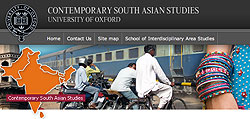 Oxford University, UK, again invites applications for its MSc in Contemporary India, a three-term, nine-month course. Deadline for applications for the next course is Friday 12 March 2010. This unique programme provides students with opportunities for a multidisciplinary immersion in knowledge about India’s signal achievements and her persistent problems, together with high quality training in research methods and in the critical analysis of theory in the main social science disciplines.
Oxford University, UK, again invites applications for its MSc in Contemporary India, a three-term, nine-month course. Deadline for applications for the next course is Friday 12 March 2010. This unique programme provides students with opportunities for a multidisciplinary immersion in knowledge about India’s signal achievements and her persistent problems, together with high quality training in research methods and in the critical analysis of theory in the main social science disciplines.
Students will develop or extend a knowledge and critical understanding of:
– the relationships between India’s development achievements and her persistent problems and the relevant academic scholarship and debates
– social science research methods, strategies and ethics that pertain to the study of contemporary India
– the principal theoretical ideas and paradigms with which research on contemporary India is conducted
critical analysis of sources and the capacity to present findings effectively, verbally and in sustained writing exercise
– the identification, execution and completion of a workable research topic
– the problems and potentials of interdisciplinarity
The degree is designed for students from a wide range of backgrounds, particularly the Social Sciences and History but not excluding any discipline. Undergraduate coursework on India or South Asia is not a prerequisite for admission. The course will serve as a valuable stand-alone training for those wishing to specialise in India, either out of academic interest or as preparation for work in the private sector, international organisations, government, NGOs, multi-lateral and bi-lateral aid and development agencies and media organisations. The course will also serve as first stage preparation for subsequent doctoral research on India.
More information.
• Time to apply for NCI’s full semester
programme in Hyderabad
The Nordic Centre in India (more information) organises full semester
programmes for Nordic students at the University of Hyderabad.
The Nordic Centre has an arrangement with the University
of Hyderabad and its Study India Program (SIP) to allow
15 Nordic students to be admitted there, and to take courses
on various social science and humanities subjects. The aim of the agreement is to allow Nordic students to study India in India, to give them both a sound academic knowledge of India as well as the experience you only gain by living there. In most cases, the UoH degree should count towards you final degree at your home university.
Please note that applicants must come from the Nordic universities that are members of the NCI consortium. The Hyderabad semester last from third week of July to
first week of December and from first week of January to
first week of May every year. Apply now for Fall Term 2010! The deadline for the application is March 15th, 2010. More
information.
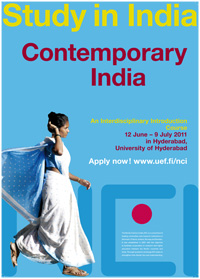 • NCI summer course on 'Contemporary India for the eighth year
• NCI summer course on 'Contemporary India for the eighth year
For the eighth time the course
'Contemporary India' will be held in the Summer 2010 (20 June – 17 July) at the
University of Hyderabad, in collaboration with the
Nordic Centre in India. The course, running for four weeks, is tailor-made for Nordic students and introduces issues
of politics, culture and economy. It consists of the following
five parts: Introductory course: The diversity of
India:
The political system and questions of identity:
Globalisation and the economy focusing on the city of Hyderabad:
Development, environment and human rights: and Indian
literature and cinema. The students coming from most Nordic
countries (and universities that are members of the Nordic
Centre in India) were given board and lodging in an excellent
guest house. Deadline for applications for the 2010 course is 15 March 2010. Each member university nominates their candidates
and reserves on this course. More
information.
• Bangalore NCI course on Environmental issues
For the fourth year, NCI offers a 7.5 ECTS summer course on environmental issues in India, in Bangalore during the period 4 – 31 July 2010. The course titled “Approaching
the Environment in India. New theories and methods in the study of the nature-society interface”, is organised in collaboration
with the Institute for Social and Economic Change (ISEC)
in Bangalore. It is a four-weeks multi-disciplinary course for graduate and post-graduate
students from the Nordic countries, that seeks to introduce
students to recent theories and methods in the study of contemporary
environmental issues in India. Deadline for applications for the 2010 course is 15 March. More
information.
• Mumbai NCI course on Demography,
Gender and Reproductive Health
For the fourth year, NCI also offers a 7.5 ECTS summer course on “Demography,
Gender and Reproductive Health”, in Mumbai during the period 18 July to 14 August 2010. It is an an introduction to population studies
in India, organised in collaboration with the International Institute for Population
Science (IIPS) in Mumbai in collaboration with NCI. The course
is a multi-disciplinary course that is open for under-graduate
and graduate students from the Nordic countries. Deadline for applications for the 2010 course is 15 March. More
information.
• Bangalore NCI course on Social Science Research Methods
For the third year NCI offers a 7.5 ECTS course titled ”Methods and Applications in Social Science Research”, organised in collaboration
with the Institute for Social and Economic Change (ISEC)
in Bangalore. The course was meant to be a multi-disciplinary course for Nordic Masters and Doctoral students. It will be held in the summer. Deadline for applications for the 2010 course is 15 March. More information about the course.
• Sanskrit Summer School at Harvard University
![]() As for last 20 years, a Sanskrit introductory course will again be
taught as part of the Harvard Summer School in 2010,
from June 21 to August 6 (final exam). It is taught by the Dept. of Sanskrit & Indian Studies at Harvard University, Cambridge, Massachussetts, USA. This course, equivalent to two semesters of coursework, enables students to acquire the basic reading skills in Sanskrit. Stress is placed on learning the Devanagari script, basic grammar, and essential vocabulary. Emphasis is also given to correct translation of passages ranging from simple narrative literature to the epics. Prerequisite: knowledge of Latin, Greek, or Hindi is useful but not required. Registration is open till 17 May 2010. More information.
As for last 20 years, a Sanskrit introductory course will again be
taught as part of the Harvard Summer School in 2010,
from June 21 to August 6 (final exam). It is taught by the Dept. of Sanskrit & Indian Studies at Harvard University, Cambridge, Massachussetts, USA. This course, equivalent to two semesters of coursework, enables students to acquire the basic reading skills in Sanskrit. Stress is placed on learning the Devanagari script, basic grammar, and essential vocabulary. Emphasis is also given to correct translation of passages ranging from simple narrative literature to the epics. Prerequisite: knowledge of Latin, Greek, or Hindi is useful but not required. Registration is open till 17 May 2010. More information.
• Sanskrit and Bollywood Summer courses at North Carolina State University
The Department of Foreign Languages and Literatures at North Carolina State University in Raleigh, USA, offers three Summer Online Courses on Elementary Sanskrit, and Bollywood Culture during the period May–June 2010. All three courses are taught by Dr. Pankaj Jain,
Teaching Assistant Professor in the department. They are part of the university's distance education program, and each worth three university credits.
– Elementary Sanskrit Course 1, full information.
– Elementary Sanskrit Course 2, full information.
– Bollywood: Films and Religions of South Asia, full information.
• Information about South Asia related
education at Swedish and Nordic universities
See SASNET’s page, http://www.sasnet.lu.se/education.html
• Uppsala-Delhi Ecology and Society Network on Environmental Change
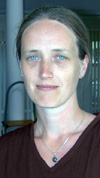 An International Workshop on ”Understanding Environmental Change: The South Asian Challenge” will be held in New Delhi on Saturday 13 March 2010. It is organized by the Uppsala-Delhi Ecology and Society Network, and hosted by the Centre of Studies in Science Policy (CSSP) at Jawaharlal Nehru University (JNU). The workshop is part of a networking project within the broad field of environmental history was initiated between researchers in Uppsala and Delhi in early 2007. The network, now entitled Uppsala-Delhi Ecology and Society Network, is co-ordinated by Dr. Gunnel Cederlöf (photo), Dept. of History, Uppsala University; and Prof. Mahesh Rangarajan at the University of Delhi. Once fully established, it will function through workshops, lectures, publications, and a website. It will further provide PhD students with external supervision and may also channel other information which is useful for pursuing research studies. Researchers involved in the network are employed at Uppsala University, the Swedish University of Agricultural Sciences in Uppsala (SLU), Jawaharlal Nehru University (JNU), University of Delhi, Delhi School of Economics, Delhi Institute of Economic Growth, and Jamia Millia Islamia University.
An International Workshop on ”Understanding Environmental Change: The South Asian Challenge” will be held in New Delhi on Saturday 13 March 2010. It is organized by the Uppsala-Delhi Ecology and Society Network, and hosted by the Centre of Studies in Science Policy (CSSP) at Jawaharlal Nehru University (JNU). The workshop is part of a networking project within the broad field of environmental history was initiated between researchers in Uppsala and Delhi in early 2007. The network, now entitled Uppsala-Delhi Ecology and Society Network, is co-ordinated by Dr. Gunnel Cederlöf (photo), Dept. of History, Uppsala University; and Prof. Mahesh Rangarajan at the University of Delhi. Once fully established, it will function through workshops, lectures, publications, and a website. It will further provide PhD students with external supervision and may also channel other information which is useful for pursuing research studies. Researchers involved in the network are employed at Uppsala University, the Swedish University of Agricultural Sciences in Uppsala (SLU), Jawaharlal Nehru University (JNU), University of Delhi, Delhi School of Economics, Delhi Institute of Economic Growth, and Jamia Millia Islamia University.
The workshop features a number of academic
papers from Indian and Swedish scholars, followed by discussions.
The three Swedish presenters are Dr. Gunnel Cederlöf herself; Dr. Pernille Gooch, Division of Human Ecology, Lund University; and Dr. Fiona Rotberg, Dept. of Government, Uppsala University. Approximately 70-80 scholars and faculty are expected to attend the
workshop. More information.
• JNU Symposium on Inter-Cultural dialogue between NE India
and SE Asia
An International Symposium on Inter-Cultural dialogue between North East India
and South East Asia will be held at New Delhi, India 17–20 March 2010. The symposium forms part of the inauguration of a new North East India Centre at Jawaharlal Nehru University (JNU), and will be attended by the Vice Chancellor Prof. B. B. Bhattacharya. Dr. Beppe Karlsson, Dept. of Social Anthropology, Stockholm University will participate, and present a paper on ”Evading the state: Lessons from James C. Scott’s book ‘The Art of not being governed: An anarchist history of upland Southeast Asia”. See the full programme (as a pdf-file).
• Sydney conference on Strategies for
Sustainability in the Indian Ocean Region
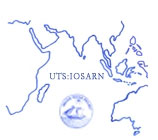 An international conference on Strategies for
Sustainability in the Indian Ocean Region will be held in Sydney, Australia, 17–19 March 2010. It is organised by the Indian Ocean and South Asia Research Network (IOSARN) at the University
of Technology in Sydney, and aims to bring together academics and activists working in a
range of fields, including environmental engineering, sustainable
architecture, humanities, geography and the social sciences, and
environmental and intellectual property law to address the question of how to conceptualise sustainable futures across the Indian Ocean region in ways that are both environmentally sensitive and socially equitable?
An international conference on Strategies for
Sustainability in the Indian Ocean Region will be held in Sydney, Australia, 17–19 March 2010. It is organised by the Indian Ocean and South Asia Research Network (IOSARN) at the University
of Technology in Sydney, and aims to bring together academics and activists working in a
range of fields, including environmental engineering, sustainable
architecture, humanities, geography and the social sciences, and
environmental and intellectual property law to address the question of how to conceptualise sustainable futures across the Indian Ocean region in ways that are both environmentally sensitive and socially equitable?
IOSARN is an initiative of the University of Technology, Sydney. The network seeks to extend innovative and trans-disciplinary research across the Humanities, Social Sciences, Sciences and Engineering. IOSARN was launched in March 2009 at the ”Re-thinking the Indian Ocean” conference.
More information about the March 2010 conference.
• Uppsala conference on Contested Civil Society in Search of Democracy
 An International conference entitled ”Power to the People?
(Con-) Tested Civil Society in Search of Democracy” will be held in Uppsala 23–24 March 2010. It is organized by the Uppsala Centre for Sustainable Development (CSD) at Uppsala University,
in cooperation with the Swedish International Development Cooperation Agency (Sida) and its Team Civil Society. The conference will try to explore differences of civil society formation across the world. Key lectures will be given by top scholars from four continents, among them Prof. Nandini Sundar, Dept. of Sociology, Delhi School of Economics, Delhi University. A series of participatory parallel sessions will also be held, a few of them focusing on South Asia.
An International conference entitled ”Power to the People?
(Con-) Tested Civil Society in Search of Democracy” will be held in Uppsala 23–24 March 2010. It is organized by the Uppsala Centre for Sustainable Development (CSD) at Uppsala University,
in cooperation with the Swedish International Development Cooperation Agency (Sida) and its Team Civil Society. The conference will try to explore differences of civil society formation across the world. Key lectures will be given by top scholars from four continents, among them Prof. Nandini Sundar, Dept. of Sociology, Delhi School of Economics, Delhi University. A series of participatory parallel sessions will also be held, a few of them focusing on South Asia.
Session 1 on ”Uncivil attachments: The role of ethnic affiliations, kinship bonds and patron-client relations in contemporary popular politics” is chaired by Dr. Beppe Karlsson, Dept. of Social Anthropology, Stockholm University;
Session 2 on ”Gendered participation in civil society: ‘New’ spaces for women or a less powerful road? What kind of space and what kind of power?” is chaired by Dr. Monica Erwér, The Swallows India Bangladesh/School of Global Studies/University of Gothenburg;
Session 3 on ”Contradictory interests within civil society: Open conflicts and new state-civil society relations” is chaired by Dr. Henrik Berglund, Dept. of Political Science, Stockholm University; and
Session 7 on ”Religious discourses as a part of civil society formation and democratization in Asia” is chaired by Dr. Ann Kull, Centre for East and Southeast Asian Studies (ACE), Lund University.
Venue: Missionskyrkan, S: Olofsgatan 40, Uppsala. More information.
• Association for Asian Studies Conference in Philadelphia
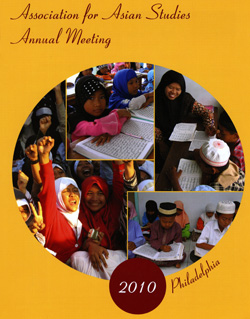 The 2010 Association for Asian Studies (AAS) Conference will be held in Philadelphia, Pennsylvania, USA, on 25–28 March 2010. AAS seeks to expand coverage of contemporary, social science, and policy-oriented issues in its 2010 meeting with a critical mass of 50 high-profile panels. The total number of panels are 282, a large number of them dealing with South Asia. Venue: Philadelphia Marriott Downtown Hotel. More information about the conference.
The 2010 Association for Asian Studies (AAS) Conference will be held in Philadelphia, Pennsylvania, USA, on 25–28 March 2010. AAS seeks to expand coverage of contemporary, social science, and policy-oriented issues in its 2010 meeting with a critical mass of 50 high-profile panels. The total number of panels are 282, a large number of them dealing with South Asia. Venue: Philadelphia Marriott Downtown Hotel. More information about the conference.
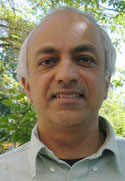 A year ago, in June 2009, SASNET forwarded an appeal for more South Asianist participation at the AAS conferences. The appeal came from Prof. Kalyanakrishnan Shivi Sivaramakrishnan (photo) of Yale University and Vice President of the American Association of Asian Studies; and Assistant Professor Ramya Sreenivasan of the University of Buffalo (being the Chair of the South Asia Council of the AAS). They invited for panel proposals for the coming two meetings of the AAS from individual members of the Swedish South Asian Studies Network in the Nordic countries and South Asia. Previously, this category has often been under-represented at the AAS annual meetings. The 2011 AAS annual meeting will be held in Honolulu, March 31–April 4, 2011.
A year ago, in June 2009, SASNET forwarded an appeal for more South Asianist participation at the AAS conferences. The appeal came from Prof. Kalyanakrishnan Shivi Sivaramakrishnan (photo) of Yale University and Vice President of the American Association of Asian Studies; and Assistant Professor Ramya Sreenivasan of the University of Buffalo (being the Chair of the South Asia Council of the AAS). They invited for panel proposals for the coming two meetings of the AAS from individual members of the Swedish South Asian Studies Network in the Nordic countries and South Asia. Previously, this category has often been under-represented at the AAS annual meetings. The 2011 AAS annual meeting will be held in Honolulu, March 31–April 4, 2011.
Read the appeal from AAS South Asia Council.
• Catherine Hall keynote speaker at BASAS 2010 conference
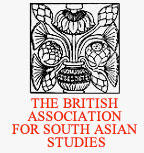 The British Association for South Asian Studies (BASAS) holds its Annual Conference 2010 at the University of Warwick, UK, 29–31 March 2010. The convenors especially welcome submissions on the theme 'Landscapes of the Imagination and South Asia'. The keynote speaker will be Professor Catherine Hall from the University College London. She will speak on the theme: ”Macaulay: writing history, writing India”. Venue: Scarman House, on the University of Warwick's central campus. On-line registration will close on Friday 12 March.
The British Association for South Asian Studies (BASAS) holds its Annual Conference 2010 at the University of Warwick, UK, 29–31 March 2010. The convenors especially welcome submissions on the theme 'Landscapes of the Imagination and South Asia'. The keynote speaker will be Professor Catherine Hall from the University College London. She will speak on the theme: ”Macaulay: writing history, writing India”. Venue: Scarman House, on the University of Warwick's central campus. On-line registration will close on Friday 12 March.
More information on BASAS 2010 conference.
 In connection with the main BASAS conference, the South Asia Area Panel of the British Academy, is proposing to hold a small and fairly informal ‘planning
workshop’ on the general theme of poverty in South Asia. The daylong workshop will be
held to coincide with the second day of the BASAS, that is on Tuesday 30 March 2010. As a planning meeting it
will be confined to a limited group of 15–20 participants. There will, however, be a 90
minute ‘report back’ session on the following day (31st March) that will be open to any
conference participants who are interested.
The main intention is to get a better grasp of the work that is being done on this theme in
universities in different parts of Europe (a couple of speakers have been invited from universities in
other European countries besides the UK, and one of them is SASNET’s former director, Prof. Staffan Lindberg, Dept. of Sociology, Lund University), and to plan for a larger and more ambitious
conference to be held in 2011 or 2012 that would involve a number of younger and less
established researchers. More information.
In connection with the main BASAS conference, the South Asia Area Panel of the British Academy, is proposing to hold a small and fairly informal ‘planning
workshop’ on the general theme of poverty in South Asia. The daylong workshop will be
held to coincide with the second day of the BASAS, that is on Tuesday 30 March 2010. As a planning meeting it
will be confined to a limited group of 15–20 participants. There will, however, be a 90
minute ‘report back’ session on the following day (31st March) that will be open to any
conference participants who are interested.
The main intention is to get a better grasp of the work that is being done on this theme in
universities in different parts of Europe (a couple of speakers have been invited from universities in
other European countries besides the UK, and one of them is SASNET’s former director, Prof. Staffan Lindberg, Dept. of Sociology, Lund University), and to plan for a larger and more ambitious
conference to be held in 2011 or 2012 that would involve a number of younger and less
established researchers. More information.
• Rule of Law in Asia theme for Focus Asia Seminar in Lund
![]() The Centre for East and South-East Asian Studies (ACE) at Lund University invites to its 12th Focus Asia seminar on Tuesday 30 March 2010. The focus for this one-day seminar, organised in collaboration with the Faculty of Law, Lund University, will be ”Interpreting the Rule of Law in Asia”, and features leading scholars in the field of law & society from around the world. This one-day conference of public lectures focuses on the rule of law in Asia. When Asia develops strong legal institutions, western models are often adopted.
The Centre for East and South-East Asian Studies (ACE) at Lund University invites to its 12th Focus Asia seminar on Tuesday 30 March 2010. The focus for this one-day seminar, organised in collaboration with the Faculty of Law, Lund University, will be ”Interpreting the Rule of Law in Asia”, and features leading scholars in the field of law & society from around the world. This one-day conference of public lectures focuses on the rule of law in Asia. When Asia develops strong legal institutions, western models are often adopted.
Transplanting western legal institutions in Asia can be interpreted as a global convergence which creates homogeneity in a world that is very diverse in local culture and resources. However, the actual operation of global institutional transplants in Asia is often loosely coupled with their formal structure. It is also argued that foreign institutional models are likely to be imported with significant modification of the systems. The lectures are open to the public and entry is free of charge.
 One of the speakers should have been Dr. Rubya Mehdi from the Carsten Niebuhr Institute, Department of Cross-Cultural and Regional Studies, University of Copenhagen, Denmark. She was supposed to lecture about ”Challenge to Divine Sanction or Compromise? With reference to Protection of Women Act 2006 in Pakistan”.
Unfortunately, she has however cancelled her participation. Instead Dr. Stig Toft Madsen (photo) will come and lecture on ”Justice and Jihad from the East India Company to the Lashkar-e-Toiba”. Venue: Telaris at Juridicum, Lund University, Lilla Gråbrödersgatan 4, Lund.
One of the speakers should have been Dr. Rubya Mehdi from the Carsten Niebuhr Institute, Department of Cross-Cultural and Regional Studies, University of Copenhagen, Denmark. She was supposed to lecture about ”Challenge to Divine Sanction or Compromise? With reference to Protection of Women Act 2006 in Pakistan”.
Unfortunately, she has however cancelled her participation. Instead Dr. Stig Toft Madsen (photo) will come and lecture on ”Justice and Jihad from the East India Company to the Lashkar-e-Toiba”. Venue: Telaris at Juridicum, Lund University, Lilla Gråbrödersgatan 4, Lund.
More information about the Focus Asia seminar.
• Postponed Haridwar seminar on Water and Culture: Legacy, Vision and Sustainable Future of Mankind
An Indian National Seminar on ”Water and Culture: Legacy, Vision and Sustainable Future of Mankind” should have been be held in Haridwar, Uttarakhand, India, on 10 - 11 April 2010. The organisers have however decided to postpone the conference.
• Aarhus workshop on Social In- and Exclusion in contemporary India
A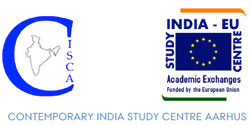 Workshop on “Social In- and Exclusion in contemporary India and beyond” will be held at the Aarhus University, Denmark, on 23–24 April 2010. It is organised by the Contemporary India Study Centre Aarhus (CISCA) at the Department of History and Area Studies. For this workshop researchers are invited to contribute with original empirical and theoretical contributions focussing on the mechanisms, politics as well as histories of two processes of social in- and exclusion – often occurring simultaneously. It is
meant to explore the ways in which various boundaries have been maintained, but have been also eroded or new lines of distinction have been invented as well as contested – often accompanied by tensions, conflicts or even violence. The workshop will offer the opportunity for a stocktaking of the often contradictory processes of in- and exclusion, to revisit some of the above mentioned academic debates and for a discussion on newly emerging and newly contested identities. Accordingly, research-based papers are invited from a wide range of disciplines dealing with the subject such as Indian/South Asian Studies, Science of
Religion, History, Political Science, Anthropology, Economics, Media Studies etc.
Deadline for submission of abstracts is 25 March 2010. More information.
Workshop on “Social In- and Exclusion in contemporary India and beyond” will be held at the Aarhus University, Denmark, on 23–24 April 2010. It is organised by the Contemporary India Study Centre Aarhus (CISCA) at the Department of History and Area Studies. For this workshop researchers are invited to contribute with original empirical and theoretical contributions focussing on the mechanisms, politics as well as histories of two processes of social in- and exclusion – often occurring simultaneously. It is
meant to explore the ways in which various boundaries have been maintained, but have been also eroded or new lines of distinction have been invented as well as contested – often accompanied by tensions, conflicts or even violence. The workshop will offer the opportunity for a stocktaking of the often contradictory processes of in- and exclusion, to revisit some of the above mentioned academic debates and for a discussion on newly emerging and newly contested identities. Accordingly, research-based papers are invited from a wide range of disciplines dealing with the subject such as Indian/South Asian Studies, Science of
Religion, History, Political Science, Anthropology, Economics, Media Studies etc.
Deadline for submission of abstracts is 25 March 2010. More information.
• University of Texas conference on Science and Technology Studies in South Asia
 The South Asia Institute of the University of Texas at Austin organises a conference on the social studies of science, technology, environment, and medicine in modern South Asia. The Science and Technology Studies in South Asia (STS) conference will be held in Austin, Texas, on May 14 and 15, 2010. The goals of this conference are simple: to offer a venue for scholars to present their work to an informed audience, to create a forum for discussion of issues of common interest, to inform participants about the state of the field, and to help build a community of STS-South Asia scholars. The conference will be organized as a sequential series of panels over two days, and will include at least one plenary lecture by a senior scholar in the field. Deadline for abstracts is 15 March 2010.
The South Asia Institute of the University of Texas at Austin organises a conference on the social studies of science, technology, environment, and medicine in modern South Asia. The Science and Technology Studies in South Asia (STS) conference will be held in Austin, Texas, on May 14 and 15, 2010. The goals of this conference are simple: to offer a venue for scholars to present their work to an informed audience, to create a forum for discussion of issues of common interest, to inform participants about the state of the field, and to help build a community of STS-South Asia scholars. The conference will be organized as a sequential series of panels over two days, and will include at least one plenary lecture by a senior scholar in the field. Deadline for abstracts is 15 March 2010.
• Kathmandu conference on Caste, Identity and Inclusion of Dalit
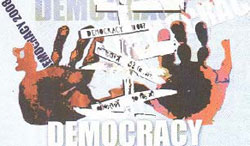 An International Conference on ”Envisioning New Nepal: Dynamics of Caste, Identity and Inclusion of Dalit” will be held in Kathmandu, Nepal, 20–22 May 2010. It is organised by Samata Foundation (SF), an organisation engaged in policy research and advocacy for the rights of marginalized people, particularly the Dalit community. The goal of SF is to promote inclusive democracy and end discrimination in Nepali society and politics. The main idea behind the conference is to involve researchers from all over the World, activists, and political party leaders in order to encourage a practitioner-academic dialogue as well as to give opportunities to people from marginalised groups to experience an academic environment. Abstracts should be submitted before 25 March 2010. The conference is co-organised by the India-China Institute at New School University, New York, USA and some other organisations, including the
International Dalit Solidarity Network (IDSN), Denmark. More information about the conference.
An International Conference on ”Envisioning New Nepal: Dynamics of Caste, Identity and Inclusion of Dalit” will be held in Kathmandu, Nepal, 20–22 May 2010. It is organised by Samata Foundation (SF), an organisation engaged in policy research and advocacy for the rights of marginalized people, particularly the Dalit community. The goal of SF is to promote inclusive democracy and end discrimination in Nepali society and politics. The main idea behind the conference is to involve researchers from all over the World, activists, and political party leaders in order to encourage a practitioner-academic dialogue as well as to give opportunities to people from marginalised groups to experience an academic environment. Abstracts should be submitted before 25 March 2010. The conference is co-organised by the India-China Institute at New School University, New York, USA and some other organisations, including the
International Dalit Solidarity Network (IDSN), Denmark. More information about the conference.
• Chennai/Brighton conference on Democracy, Global Politics and International Relations
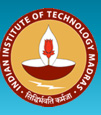 The Centre for Comparative European Union Studies (CCEUS), at the
Dept. of Humanities & Social Sciences, Indian Institute of Technology (IIT) Madras in Chennai, India, organizes
its first International Workshop, in partnership with the Dept. of Sociology, University of
Sussex in Brighton, UK, 28 June – 3 July 2010. The broad area of the workshop is Democracy, Global Politics and International Relations and the topic of the workshop is “Reinterpreting the State”. The workshop is organized around lectures delivered and readings selected by faculty; and presentations by the participants. The maximum number of participants the workshop could accommodate is 35 across a range of disciplines within humanities and social sciences. Deadline for applications is 26 March 2010. Venue: Industrial Consultancy and Sponsored Research (IC & SR) Hall II, IIT Madras. More information.
The Centre for Comparative European Union Studies (CCEUS), at the
Dept. of Humanities & Social Sciences, Indian Institute of Technology (IIT) Madras in Chennai, India, organizes
its first International Workshop, in partnership with the Dept. of Sociology, University of
Sussex in Brighton, UK, 28 June – 3 July 2010. The broad area of the workshop is Democracy, Global Politics and International Relations and the topic of the workshop is “Reinterpreting the State”. The workshop is organized around lectures delivered and readings selected by faculty; and presentations by the participants. The maximum number of participants the workshop could accommodate is 35 across a range of disciplines within humanities and social sciences. Deadline for applications is 26 March 2010. Venue: Industrial Consultancy and Sponsored Research (IC & SR) Hall II, IIT Madras. More information.
• Lund conference on Sikhs in Europe. Migration, Identity and Translocal Practices
A conference on ”Sikhs in Europe. Migration, Identity and Translocal Practices, will be held at Lund University, 16–18 June 2010. It will be organised by the Centre for Theology and Religious Studies (CTR) at Lund University, convened by Dr. Kristina Myrvold. The aim is to gather leading scholars in the multidisciplinary
field of Sikh studies and discuss current research projects focusing on
patterns of migration, identity formations, self-representations, transmission of
traditions and translocal practices among Sikhs in different parts of Europe. While
two conference days are dedicated to presentation and peer-review of papers by the
members of the academic network Sikhs-in-Europe, the third conference day will be a
workshop for Ph.D. students affiliated to European universities. The conference is
public and open to students and researchers in all disciplines. More information, including full programme.
• Bergen Summer Research School on Global Health in Bio-Medical, Social and Cultural Perspectives
 The third edition of the Bergen Summer Research School is dedicated to the theme of Global Health in Bio-Medical, Social and Cultural Perspectives, and will be held 21 June – 2 July 2010. PhD students and junior researchers from the whole world have been invited to
participate. The 2010 theme will intersect with the other key topics of the Bergen Summer Research School (poverty, climate, environment, energy, norms, values, language and culture) and aims to promote collaboration, interaction and joint learning across disciplines on research topics and challenges related to global health and development. These challenges affect all countries in all income categories.
The third edition of the Bergen Summer Research School is dedicated to the theme of Global Health in Bio-Medical, Social and Cultural Perspectives, and will be held 21 June – 2 July 2010. PhD students and junior researchers from the whole world have been invited to
participate. The 2010 theme will intersect with the other key topics of the Bergen Summer Research School (poverty, climate, environment, energy, norms, values, language and culture) and aims to promote collaboration, interaction and joint learning across disciplines on research topics and challenges related to global health and development. These challenges affect all countries in all income categories.
The concept of Global Health is defined as “an area for study, research and practice that places a priority on improving health and achieving equity in health for all people worldwide.
The main basis for BSRS is a series of parallel high quality doctoral courses targeted exclusively for doctoral candidates and junior researchers. The 2010 edition of the Research School plans to offer 8 parallel courses which cover a range of thematic, theoretical and methodological topics important for research on major global health challenges. Each course is based in its own disciplinary framework(s), whether it be in medicine, the humanities, natural or social sciences, but also developed to form a basis for interdisciplinary communication and methodological development in a cross-cultural and multidisciplinary research context.
Deadline for submitting the application
form was 1 March 2010. More information.
• Singapore conference on the ‘Chindia’ Challenge to Global Communication
As a preconference to the International Communication Association Conference (ICA 2010) that will be held in Singapore 22–26 June 2010, a one day-conference on ”The ‘Chindia’ Challenge to Global Communication” will be arranged on Tuesday 22 June 2010. It is conceived and organized by Prof.
Daya Thussu, Director of India Media Centre at the University of Westminster, London. The pre-conference is supported by the
Mass Communication Division of the ICA, and by the Center for Global Communication Studies, Annenberg School for Communication, University of Pennsylvania, USA. The focus will be on the transformation of communication and media in China and India – the world’s two most populous countries and fastest growing economies, and its profound implications for what constitutes the ‘global’. More information.
• Göttingen workshop on Space, Capital and Social History in South Asia
An international workshop on ”Space, Capital and Social History in South Asia” will be held at the University of Göttingen, Germany, 24–26 June 2010. It is organised by the Dept. of History at the university’s newly founded Centre for Modern Indian Studies. Papers are invited from historians and social scientistson issues such as, – the de-industrialisation of formerly celebrated ‘Manchesters of the East’ like Ahmedabad and the gentrification of workers’ neighbourhoods like Mumbai’s vast ‘factory village’ Girangaon; – the relocation of industries and the rapid production of new, transnationally connected landscapes of capital (like that of Gurgaon) brought to life by both ‘informally’ and ‘formally’ employed work forces; – violent conflicts over land for capital-induced ‘Special Economic Zones’ or schemes of infrastructural ‘development’; and – the seemingly irresistible rise of the corporate ‘developer’ and the dynamics of spatial segregation in India’s metropolitan cities. More information.
• Leiden workshop on Asian Countries as Exhibited at World Expositions
 A workshop on ”Asian Countries as Exhibited at World Expositions: Revisited in a Global Historical Perspective” will be held in Leiden, the Netherlands on 25 June 2010. It is organised by the International Institute for Asian Studies (IIAS). Emphasis will be given to issues regarding how the coloniser (the ‘West’) and the colonised (the ‘East’) (mis)represented and intermingled with one other at expositions held between the late 19th century and the early 20th century. We particularly welcome comparative and interdisciplinary case studies of individual Asian countries including China, India, Indonesia, Japan, and Korea which disclose how they competed and struggled with each other in the pursuit of modernisation.
Deadline for submitting abstacts is 15 March 2010. More information.
A workshop on ”Asian Countries as Exhibited at World Expositions: Revisited in a Global Historical Perspective” will be held in Leiden, the Netherlands on 25 June 2010. It is organised by the International Institute for Asian Studies (IIAS). Emphasis will be given to issues regarding how the coloniser (the ‘West’) and the colonised (the ‘East’) (mis)represented and intermingled with one other at expositions held between the late 19th century and the early 20th century. We particularly welcome comparative and interdisciplinary case studies of individual Asian countries including China, India, Indonesia, Japan, and Korea which disclose how they competed and struggled with each other in the pursuit of modernisation.
Deadline for submitting abstacts is 15 March 2010. More information.
• SOAS hosts 16th Himalayan Languages Symposium
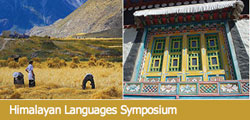 The 16th Himalayan Languages Symposium will be held in London, UK, 2–5 September 2010. It will be hosted by the School of Oriental and African Studies (SOAS) at University of London. The Himalayan Languages Symposium was first held at Leiden University in 1995 and is now well-established an as an annual open forum for scholars of all aspects of Himalayan languages. The focus of the conference is geographical rather than language-based, reflecting the huge linguistic diversity of the Himalaya, and the depth of contact and syncretism between Himalayan languages and cultures. Abstracts should be submitted before 1 April 2010. The keynote speech will be delivered by Dr. Martine Mazaudon from Centre National de la Recherche Scientifique (CNRS) in Paris, France. She will talk about ”Dialectology and language change: paths to tone in Tamangish languages”, a group of Tibeto-Burman languages spoken in Nepal. Venue: College Buildings, SOAS, Hall G 2, Russell Square. More information.
The 16th Himalayan Languages Symposium will be held in London, UK, 2–5 September 2010. It will be hosted by the School of Oriental and African Studies (SOAS) at University of London. The Himalayan Languages Symposium was first held at Leiden University in 1995 and is now well-established an as an annual open forum for scholars of all aspects of Himalayan languages. The focus of the conference is geographical rather than language-based, reflecting the huge linguistic diversity of the Himalaya, and the depth of contact and syncretism between Himalayan languages and cultures. Abstracts should be submitted before 1 April 2010. The keynote speech will be delivered by Dr. Martine Mazaudon from Centre National de la Recherche Scientifique (CNRS) in Paris, France. She will talk about ”Dialectology and language change: paths to tone in Tamangish languages”, a group of Tibeto-Burman languages spoken in Nepal. Venue: College Buildings, SOAS, Hall G 2, Russell Square. More information.
The 5th Medieval Tibeto-Burman Languages Symposium will be held as a panel of the 16th Himalayan Languages Symposium, on 1 September 2010 (also at SOAS in London). Now the majority of the world’s languages are under imminent threat of extinction, thorough description of the hundreds of living Tibeto-Burman languages is of great urgency. Along with this task, research into the earlier stages of Tibeto-Burman languages with a long written history is also vital. The older written Tibeto-Burman languages, such as Bailang (1st cent), Tibetan (8th cent), Newar (9th cent), Burmese (12th cent), Tangut (13th cent) and Manipuri provide a diachronic depth to comparative, historical and typological studies of contemporary languages, and are essential for solving many of the puzzles which today’s tongues present. This has been well understood in Indo-European linguistics for a long time, and Indo-Europeanists are aware of the value of the classical languages such as Hittite, Tocharian, Sanskrit and Greek in deciphering contemporary phenomena. In Tibeto-Burman scholarship this method has been less commonly employed, and the older languages of the Tibeto-Burman family have been unjustly neglected.
A major aim of this meeting is therefore to stimulate interaction among scholars working on different languages in Tibeto-Burman and approaching them from different perspectives. Papers of any kind dealing with primary texts in the older Tibeto-Burman languages are welcome, whether the focus be linguistic, philological, textual, historical or literary. Venue: Russell Square: Khalili Lecture Theatre, College Buildings, SOAS. More information.
• 46th Annual Meeting of the New York State
Conference on Asian Studies
The State University of New York College at Brockport will host the 46th Annual Meeting of the New York State
Conference on Asian Studies (NYCAS), to be held 1–2 October 2010. Asia is defined to include East Asia, Southeast Asia, South Asia, and
Southwest Asia – from Japan in the East to Turkey in the West.
While the Conference has a dual theme of ”Democracy in Asia” and ”Men& Women of Asia”, panels, individual papers, and roundtable
proposals on all aspects of Asian history, geography, economics,
politics, sociology, anthropology, literature as well as current
developments on the continent of Asia are also welcomed. During the conference, a roundtable discussion including
Ambassadors from South Asia (including Afghanistan) will be held.
All proposals should be submitted before 31 May 2010. More information.
• 50th Anniversary of Madison Conference on South Asia
 The 39th Annual Madison Conference on South Asia will be held 14 – 17 October 2010. This year the Conference is pleased to recognize and
celebrate 50 Years of South Asia at the University of Wisconsin-Madison. The conference is hosted by the university’s Center for South Asia, and attracts over 500 scholars and specialists on South Asia and is a great venue for intellectual, professional, and social exchange. Panels, roundtables,pre-conferences and individual papers on all topics pertaining to South Asian studies are welcome. The conference features nearly 100 academic panels and roundtables, as well as association meetings and special events ranging from performances to film screenings. Another important component of the conference is our exhibit space. University presses, independent publishers, and non-profit organizations provide the conference participants with high quality resources and the best publications on South Asian topics. The exhibit space is also a great opportunity to meet with other scholars and to connect with the booksellers. Deadline for proposal submissions is 1 April 2010. Venue: Madison Concourse Hotel, 1 West Dayton St., Madison, Wisconsin, USA. More information.
The 39th Annual Madison Conference on South Asia will be held 14 – 17 October 2010. This year the Conference is pleased to recognize and
celebrate 50 Years of South Asia at the University of Wisconsin-Madison. The conference is hosted by the university’s Center for South Asia, and attracts over 500 scholars and specialists on South Asia and is a great venue for intellectual, professional, and social exchange. Panels, roundtables,pre-conferences and individual papers on all topics pertaining to South Asian studies are welcome. The conference features nearly 100 academic panels and roundtables, as well as association meetings and special events ranging from performances to film screenings. Another important component of the conference is our exhibit space. University presses, independent publishers, and non-profit organizations provide the conference participants with high quality resources and the best publications on South Asian topics. The exhibit space is also a great opportunity to meet with other scholars and to connect with the booksellers. Deadline for proposal submissions is 1 April 2010. Venue: Madison Concourse Hotel, 1 West Dayton St., Madison, Wisconsin, USA. More information.
• Copenhagen conference on Asian Diversity in a Global Context
 The Asian Dynamics Initiative (ADI) at the University of Copenhagen invites to an international three-day conference entitled ”Asian Diversity in a Global Context” 11–13 November 2010. The opening day of the conference is allocated to a big public event with invited keynote speakers. The following two days will be made up of 10-12 parallel panels and workshops under the common theme ”Asian
Diversity in a Global Context”. The goal is to generate deeper and fuller insights into the political, social, cultural and economic changes facing Asia in the 21st century. The conference welcomes papers relating to one of the themes of the conference panels and workshops. Deadline for submission of abstracts was 1 March 2010 Some of the panels are specifically related to South Asia:
The Asian Dynamics Initiative (ADI) at the University of Copenhagen invites to an international three-day conference entitled ”Asian Diversity in a Global Context” 11–13 November 2010. The opening day of the conference is allocated to a big public event with invited keynote speakers. The following two days will be made up of 10-12 parallel panels and workshops under the common theme ”Asian
Diversity in a Global Context”. The goal is to generate deeper and fuller insights into the political, social, cultural and economic changes facing Asia in the 21st century. The conference welcomes papers relating to one of the themes of the conference panels and workshops. Deadline for submission of abstracts was 1 March 2010 Some of the panels are specifically related to South Asia:
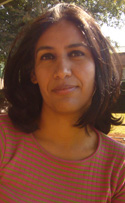 – Governing Difference: Explorations in Identity and Equality in the Global South, convened by Dr. Ravinder Kaur (photo to the right).
– Governing Difference: Explorations in Identity and Equality in the Global South, convened by Dr. Ravinder Kaur (photo to the right).
– The Transmission of Sanskrit Medical Literature in India, convened by Dr. Kenneth Zysk
– Indigenous people in the 21st Century Asia: Identities and Stategies for self-determination, convened by Dr. Peter B. Andersen
'Asian Diversity in a Global Context' is the third in the series of annual conferences initiated by ADI and the University of Copenhagen in 2008. ADI aims at expanding research and teaching on Asia as well as strengthening the university's global networks in studies of Asia.
More information about the Asian Diversity in a Global Context conference.
• Copenhagen PhD workshop for graduate students
 The Asian Diversity in a Global Context conference (see above) will be directly followed by a two-day PhD workshop for graduate students on 14-15 November 2010. The workshop, open to PhD students at any stage of their PhD projects, has the theme ”How can we capture specificities with our approaches and methods?”
It is fully integrated with the conference held on the previous days. PhD students are therefore invited to both submit abstracts for a conference paper in the conference and/or a paper at the PhD workshop. Conference papers must however relate to one of the themes of the conference panels and workshops. Since the conference and the PhD workshop are integrated, participation in both activities will not only expose the participants to a wide variety of international expertise from the humanities and social sciences but also provide an opportunity to interact with both senior and junior scholars as well as other PhD students.
The Asian Diversity in a Global Context conference (see above) will be directly followed by a two-day PhD workshop for graduate students on 14-15 November 2010. The workshop, open to PhD students at any stage of their PhD projects, has the theme ”How can we capture specificities with our approaches and methods?”
It is fully integrated with the conference held on the previous days. PhD students are therefore invited to both submit abstracts for a conference paper in the conference and/or a paper at the PhD workshop. Conference papers must however relate to one of the themes of the conference panels and workshops. Since the conference and the PhD workshop are integrated, participation in both activities will not only expose the participants to a wide variety of international expertise from the humanities and social sciences but also provide an opportunity to interact with both senior and junior scholars as well as other PhD students.
This workshop is organized by a group of researchers at the University of Copenhagen who have participated in the development of the university's Asian Dynamics Initiative and in organizing the ‘Asian Diversity in a Global Context' conference.
The members of the workshop faculty are a number of specially invited international mentors (including Prof. Paul Bailey, University of Edinburgh, and Prof. Nandini Sundar, Delhi University/Yale), and three mentors from the University of Copenhagen (Associate Professor Birgitte R. Sørensen, Anthropology, Associate Professor Ravinder Kaur, South Asian Studies, and Prof. Jørgen Delman, China Studies).
More information about the PhD Course and registration.
• Indian Association for Asian & Pacific Studies holds conference in Sikkim
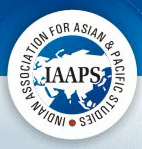 The Fifth Biennial International Conference of the Indian Association for Asian & Pacific Studies (IAAPS) will be held at Sikkim University in Gangtok, India, 10–12 December 2010. It will be organized by the university’s School of Peace, Conflict and Human Security Studies. Sikkim University is a new National University, established by the Government of India in 2007. It is being designed for academic excellence and innovative interdisciplinary research and a strong instrument of regional development and cross-border
integration.
The Fifth Biennial International Conference of the Indian Association for Asian & Pacific Studies (IAAPS) will be held at Sikkim University in Gangtok, India, 10–12 December 2010. It will be organized by the university’s School of Peace, Conflict and Human Security Studies. Sikkim University is a new National University, established by the Government of India in 2007. It is being designed for academic excellence and innovative interdisciplinary research and a strong instrument of regional development and cross-border
integration.
The fifth IAAPS conference will be a meeting point of
scholars working on Asian & Pacific studies. Participation is expected of
scholars from all regions of Asia to enrich the already established
network between Indian scholars & scholars across Asia-Pacific regions.
The keynote speaker will be Ambassador K Kesavapany, Director for the Institute of South East Asian
Studies in Singapore. Deadline for submission of abstracts is 30 April 2010. More information.
• Kuala Lumpur Conference on Learning Theories in Asia
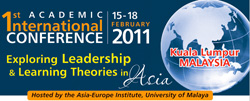 The First Academic International Conference on ‘Exploring Leadership & Learning Theories in Asia’ (ELLTA) will be hosted by the Asia-Europe Institute at University of Malaya in Kuala Lumpur, Malaysia, 15–18 February 2011.
The First Academic International Conference on ‘Exploring Leadership & Learning Theories in Asia’ (ELLTA) will be hosted by the Asia-Europe Institute at University of Malaya in Kuala Lumpur, Malaysia, 15–18 February 2011.
 The conference is organised by Dr. Anders Örtenblad (photo), PhD in Business administration, and till recently working at Halmstad University, Sweden; Mr. Muhammad Babur, Aga Khan University’s Institute for Educational Development (AKU-IED) in Karachi, Pakistan; and Ms. Roshni Kumari, also from AKU-IED.
The conference is organised by Dr. Anders Örtenblad (photo), PhD in Business administration, and till recently working at Halmstad University, Sweden; Mr. Muhammad Babur, Aga Khan University’s Institute for Educational Development (AKU-IED) in Karachi, Pakistan; and Ms. Roshni Kumari, also from AKU-IED.
The core emphasis of the conference is on understanding Asian perspectives on leadership and learning. The questions that the conference intends to address are:
– Are the west-inspired theories on leadership and learning relevant for Asia in general and different contexts in Asia in particular?
– Is there a need to develop theories specific for Asia in general and different contexts in Asia in particular?
– Are there existing theories on leadership and learning with an Asian origin, which have not received much attention or have not been acknowledged so far?
Abstracts should be submitted before 15 June 2010.
Read the announcement for the conference (as a pdf-file).
More information on the conference website.
• Other conferences connected to South Asian
studies arranged all over the World
See SASNET’s page, http://www.sasnet.lu.se/conferences.html#conf
Important lectures and seminars in Scandinavia
• Copenhagen seminar on Liberalisation, Hindu Nationalism and the State
The Centre of Global South Asian Studies at Copenhagen University invites to a public seminar by Dr. Nikita Sud, Department of International Development, University of Oxford, on Monday 15 March 2010, 10.00. Dr. Sud will talk about 'Liberalisation, Hindu Nationalism and the State'. The seminar is organised as a ADI (Asian Dynamics Initiative) South Asia Lecture. Dr. Sud’s presentation is based on a forthcoming book, exploring an Indian province at the forefront of economic liberalisation and growth, namely Gujarat. More information.
• Stockholm seminar on Politics of Devolution and Development in
Sri Lanka
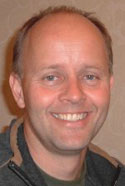 Prof. Kristian Stokke (photo) from the Dept. of Sociology and Human
Geography, Oslo University, will hold a seminar in Stockholm on Monday 15 March, at 15.00. The topic will be ”Liberal Peace in Question: Politics of Devolution and Development in
Sri Lanka”. The seminar is arranged by the Politics of Development Group at
Stockholm University (Podsu) in cooperation with the Development
Research Network on Nature, Poverty and Power (Devnet). Prof. Stokke is currently about to complete a book entitled ”Liberal Peace in
Question: Politics of State and Market Reforms in Sri Lanka”. His latest publications include “United
against HIV/AIDS? Politics of Local Governance in Lusikisiki, South
Africa” (with Jane Vogt Evensen, in Journal of Southern African
Studie); ”Civil Society in Sri Lanka during and after the 5th
Peace Process: Changing Spaces for Advocating Political Transformations
and Delivering Social Welfare Post-9/11” (in Civil Society Under
Strain. Kamurian Press, 2009); ”Rethinking Popular Representation” (ed with Olle Törnquist and Neill Webster, Palgrave Macmillan, 2009);
and ”Identity and Society. Social Exclusion and Inclusion in Nepal” (ed with Joanna Pfaff-Czarnecka and Mohan Das Manandhar, Mandala Book
Point, 2009).
Prof. Kristian Stokke (photo) from the Dept. of Sociology and Human
Geography, Oslo University, will hold a seminar in Stockholm on Monday 15 March, at 15.00. The topic will be ”Liberal Peace in Question: Politics of Devolution and Development in
Sri Lanka”. The seminar is arranged by the Politics of Development Group at
Stockholm University (Podsu) in cooperation with the Development
Research Network on Nature, Poverty and Power (Devnet). Prof. Stokke is currently about to complete a book entitled ”Liberal Peace in
Question: Politics of State and Market Reforms in Sri Lanka”. His latest publications include “United
against HIV/AIDS? Politics of Local Governance in Lusikisiki, South
Africa” (with Jane Vogt Evensen, in Journal of Southern African
Studie); ”Civil Society in Sri Lanka during and after the 5th
Peace Process: Changing Spaces for Advocating Political Transformations
and Delivering Social Welfare Post-9/11” (in Civil Society Under
Strain. Kamurian Press, 2009); ”Rethinking Popular Representation” (ed with Olle Törnquist and Neill Webster, Palgrave Macmillan, 2009);
and ”Identity and Society. Social Exclusion and Inclusion in Nepal” (ed with Joanna Pfaff-Czarnecka and Mohan Das Manandhar, Mandala Book
Point, 2009).
Venue for the seminar: Dept. of Political Science, Stockholm University, Room F 702, Universitetsvägen 10 F, Frescati, Stockholm.
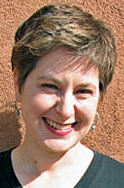
• Copenhagen seminar on Philanthropy and Empathy in New Delhi
Erica Bornstein, Assistant Professor in Anthropology at the University of Wisconsin, Milwaukee, USA, will hold an open guest lecture on ”Philanthropy and Empathy in New Delhi” at the
Department of Cross-Cultural and Regional Studies (TORS), University of Copenhagen, on
Tuesday 16 March 2010, 14.00–16.00. Dr. Bornstein has done extensive research in the areas of philanthropy, charity and humanitarianism, development, human rights, NGOs, political anthropology, and religion, and she has fieldwork experience from southern Africa and India. Bornstein is the author of ‘The Spirit of Development. Protestant NGOs, Morality and Economics in Zimbabwe.’ (Stanford University Press, 2005), and ‘Disquieting Gifts: An Ethnography of Humanitarianism in New Delhi.’ (Stanford University Press, forthcoming). Venue: TORS, Room U3 (1st floor), Snorresgade 17-19, Copenhagen. More information.
• Copenhagen Business School seminar on Democracy and Poverty in India
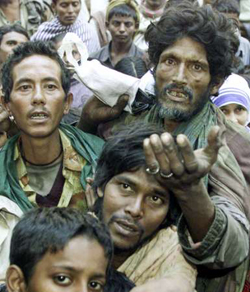 The Asia Research Centre at Copenhagen Business School (CBS), invites to an open guest lecture by Prof. Yogendra Yadav, Senior Fellow at the Centre for the Study of Developing Societies, Delhi, India, on Wednesday 17 March 2010, 14.00–15.30. Prof. Yadav will lecture about ”Democracy and Poverty in India”. Currently Yadav is a Fellow at the Institute of Advanced Study at Berlin, Germany, for the year 2009–2010. His areas of interests include democratic theory, election studies, survey research, political theory, modern Indian political thought and Indian socialism. He has co-authored State of Democracy in South Asia (OUP, 2008) and co-edited (with Sandeep Shastri and K C Suri) Electoral Politics in Indian States (OUP, 2009).
The Asia Research Centre at Copenhagen Business School (CBS), invites to an open guest lecture by Prof. Yogendra Yadav, Senior Fellow at the Centre for the Study of Developing Societies, Delhi, India, on Wednesday 17 March 2010, 14.00–15.30. Prof. Yadav will lecture about ”Democracy and Poverty in India”. Currently Yadav is a Fellow at the Institute of Advanced Study at Berlin, Germany, for the year 2009–2010. His areas of interests include democratic theory, election studies, survey research, political theory, modern Indian political thought and Indian socialism. He has co-authored State of Democracy in South Asia (OUP, 2008) and co-edited (with Sandeep Shastri and K C Suri) Electoral Politics in Indian States (OUP, 2009).
Yogendra Yadav has also been involved in designing and coordinating the National Election Studies, the most comprehensive series of academic surveys of the Indian electorate, from 1996 to 2009. Venue: Room PH 218, CBS, Porcelænshaven 16, Frederiksberg, Copenhagen.
More information on the Copenhagen lecture.
• Gothenburg seminars on NGOs and Sufis in Bangladesh
Dr. Manzurl Mannan from Independent University Bangladesh (IUB), will hold two public lectures at Gothenburg University on Friday 19 March 2010. His visit to Gothenburg is part of the new collaboration between Independent University Bangladesh and the School of Global Studies (SGS), University of Gothenburg.
– First he will talk about “NGOs, Global Development and Local Culture: The Case of Bangladesh”, from 10.00–12.00. Venue: SGS, Annedalseminariet, room 419, Campus Linné.
– From 14.00–16.00, he will talk about ”Anthropological Reflections on Neo-Islamist and Western Hegemony: A Sufi Perspective from Bangladesh”. This is done on an invitation from the seminar group focusing on “Anthropology of Religion” at SGS. Venue: Room E409, Campus Linné. More information.
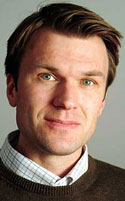
• Torkel Brekke lectures on Eschatology in South Asia
Professor
Torkel Brekke, Department of Culture Studies and Oriental Languages (IKOS), University of Oslo, will hold a lecture on ”Tid, historia och eskatologi i Sydasien” (Time, History, and Eschatology in South Asia) in Stockholm on Thursday 25 March 2010. It is part of a one-day interdisciplinary seminar organised by the Swedish Research Council’s Scientific Council for the Humanities and Social Sciences. The theme for the entire seminar, held from 10 A.M. till 3 P.M., is ”Cirkelgångens förunderliga väsen” (The Wonderful Essence of Circular Movement), focusing on cyclic courses from different perspectives, be that of an economist, a geographer, a philosopher, a mathematician, etc.
Prof. Brekke’s presentation focuses on the difference in time perception between Indic and Western religions, between so-called cyclic
and linear outlooks. This phenomenon is commonly supposed to be reflected in the way life, death and history are interpreted in different cultures. However, Torkel Brekke wants to play down the real difference in attitudes.
The seminar is free of charge, but a binding pre-registration is necessary.
This should be done before 16 March.
Venue for the seminar:
Piperska Muren, Scheelegatan 14, Stockholm. More information, incl. full programme and registration form.
• Aarhus seminar on Democracy in South Asia: the village perception
The Contemporary India Studies Centre Aarhus (CISCA) invites to a guest lecture by Prof. Arild Engelsen Ruud, University of Oslo, on Tuesday 6 April 2010, 14-00–16.00. Prof. Ruud will talk about ”Democracy in South Asia: the village perception”. Venue: Building 1410, CISCA, Aarhus Universitet, Nordre Ringgade 1, Aarhus, Denmark. More information.
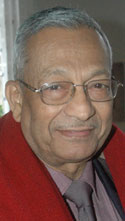 • Partha Nath Mukherji lectures at Lund University
• Partha Nath Mukherji lectures at Lund University
Prof. Partha Nath Mukherji, holding the S.K Dey Chair at the Institute of Social Sciences in New Delhi, India, will hold an open lecture at Lund University on Friday 9 April 2010, 10.15 – 12.00. He will talk about ”Social Mobility: Conceptual-theoretical orientation”. Prof. has done teaching and research in sociology at Patna University; Delhi School of Economics; Jawaharlal Nehru University; and at the Indian Statistical Institute (in both Kolkata and Delhi). He has also been Director (Vice-Chancellor) at Tata Institute of Social Sciences (TISS) in Mumbai; Director for the Council for Social Development in New Delhi; and Senior Fellow at Nehru Memorial Museum and Library, New Delhi. His main areas of interest are social movement and social change, research methodology, democratic decentralisation, nation-state. He is a former President of the Indian Sociological Society. Venue for the seminar: Room 2065, Centre for East and South-East Asian Studies (ACE), Lund University, Scheelevägen 15 D.
• Rajmohan Gandhi lectures at Oslo University
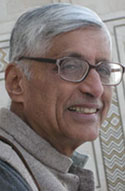 Professor Rajmohan Gandhi from the Center for South Asian and Middle Eastern Studies, Illinois University, USA, holds a guest lecture at Oslo University on Friday 9 April 2010, 11.00–12.00. Rajmohan Gandhi, grandson of Mahatma Gandhi and the President of Initiatives of Change (IofC), will speak about ”Afghanistan, India and Pakistan: Can suspicious neighbours move towards cooperation?”. He has been invited by the Norwegian Institute of International Affairs (NUPI). Rajmohan Gandhi has worked consistently for India-Pakistan and Hindu-Muslim reconciliation. He has written several books among them A Tale of Two Revolts: India 1857 & the American Civil War (Penguin, 2009), Revenge & Reconciliation: Understanding South Asian History (Penguin, 1999) and Eight Lives: A Study of the Hindu-Muslim Encounter (SUNY, 1987). The biography of his grandfather Mahatma Gandhi, Mohandas: A True Story of a Man, His People and an Empire (Penguin, 2007), received the prestigious Biennial Award from the Indian History Congress in 2007. Venue:
NUPI, C.J. Hambros plass 2 D, Oslo. More information.
Professor Rajmohan Gandhi from the Center for South Asian and Middle Eastern Studies, Illinois University, USA, holds a guest lecture at Oslo University on Friday 9 April 2010, 11.00–12.00. Rajmohan Gandhi, grandson of Mahatma Gandhi and the President of Initiatives of Change (IofC), will speak about ”Afghanistan, India and Pakistan: Can suspicious neighbours move towards cooperation?”. He has been invited by the Norwegian Institute of International Affairs (NUPI). Rajmohan Gandhi has worked consistently for India-Pakistan and Hindu-Muslim reconciliation. He has written several books among them A Tale of Two Revolts: India 1857 & the American Civil War (Penguin, 2009), Revenge & Reconciliation: Understanding South Asian History (Penguin, 1999) and Eight Lives: A Study of the Hindu-Muslim Encounter (SUNY, 1987). The biography of his grandfather Mahatma Gandhi, Mohandas: A True Story of a Man, His People and an Empire (Penguin, 2007), received the prestigious Biennial Award from the Indian History Congress in 2007. Venue:
NUPI, C.J. Hambros plass 2 D, Oslo. More information.
Business and Politics
• Information about South Asia related business and politics in Sweden
See SASNET's page, http://www.sasnet.lu.se/polbuss.html
South Asia related culture in Scandinavia
• More information about South Asia related culture
in Sweden and Scandinavia
See SASNET’s page, http://www.sasnet.lu.se/culture.html
New and updated items on SASNET web site
• Swedish departments where research on
South Asia is going on:
Constantly added to the list of research environments at Swedish
universities, presented by SASNET. The full list now includes 265 departments,
with detailed descriptions of the South Asia related research and education
taking place! Go to http://www.sasnet.lu.se/environment.html
‡ Department of Theoretical Chemistry, School of Biotechnology, Royal Institute of Technology (KTH), Stockholm
‡ Stockholm International Peace Research Institute (SIPRI), Stockholm
• Useful travelling information
Look at http://www.sasnet.lu.se/travelling.html.
Updated travel advises from the The British Foreign & Commonwealth
Office about safety aspects on travelling to the countries of
South Asia.
Best regards,
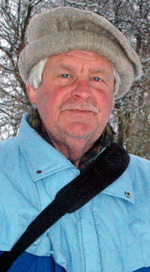 Lars
Eklund
Lars
Eklund
deputy director/webmaster
SASNET/Swedish South Asian Studies Network
SASNET is a national network for research, education, and information about South Asia based at Lund University. Its aim is to promote a dynamic networking process in which Swedish researchers co-operate with researchers in South Asia and globally.
The SASNET network is open to all the sciences. Priority is given to interdisciplinary cooperation across faculties, and more particularly to institutions in the Nordic countries and South Asia. SASNET believes that South Asian studies will be most fruitfully pursued as a cooperative endeavour between researchers in different institutions who have a solid base in their mother disciplines.
The network is financed by Lund
University.
Postal address: SASNET – Swedish South Asian Studies Network,
Scheelevägen 15 D, SE-223 70 Lund, Sweden
Visiting address: Ideon Research Park, House Alpha 1 (first floor,
room no. 2040), in the premises of the Centre for East and South
East Asian Studies at Lund University (ACE).
Phone: + 46 46 222 73 40
Fax: + 46 46 222 30 41
E-mail: sasnet@sasnet.lu.se
Web site:
http://www.sasnet.lu.se
SASNET - Swedish South Asian Studies Network/Lund
University
Address: Scheelevägen 15 D, SE-223 70 Lund, Sweden
Phone: +46 46 222 73 40
Webmaster: Lars Eklund
Last updated
2011-01-12